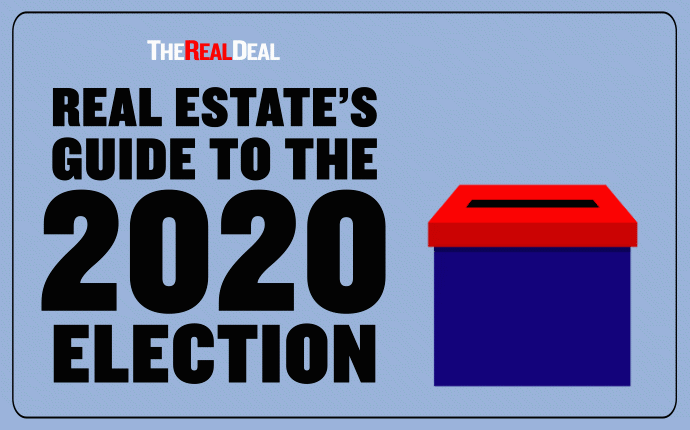With three weeks to go until Election Day, the nation’s first developer-in-chief is trailing in the race when it comes to donations from his own industry.
But little is surprising in an economy reeling from the pandemic, raging wildfires and civil unrest.
To get an idea of where real estate players are putting their money as President Donald Trump and Joe Biden prepare to square off on Nov. 3, The Real Deal has pored over Federal Election Commission data. We have compiled a live, searchable database ranking the biggest contributions from real estate — those exceeding $5,000.
Some industry players — private equity firms included — say Trump’s chaotic first term has pushed them away.
Despite the president having raised roughly $2 million less than Biden in real estate cash, he still has a camp of loyal followers, particularly in South Florida. In Los Angeles, Trump has one very deep-pocketed real estate donor, though the former vice president has pulled in campaign contributions from a broader range of the city’s industry players.
Who are the biggest contributors from the industry in 2020 and what do they stand to gain? Click here to find out.
A cheat sheet on the issues
1031 exchanges
As part of a broader plan to roll back Trump-era tax cuts, Biden has proposed making 1031 exchanges available only to those making less than $400,000 a year. The change would help raise revenue for Biden’s $775 billion plan to fund child and elderly care over the next decade. While many in the industry are skeptical that Biden would follow through with restricting 1031s, they assert that doing so would hurt an already struggling economy.
Property taxes
The Tax Cuts and Jobs Act of 2017 implemented a $10,000 cap on deductions of state and local taxes. That aspect of the law disproportionately hit high-tax states such as New York and New Jersey, where tax bills typically exceed $10,000, putting a chill on the residential market in those areas.
If Congress were to pass a measure to raise or eliminate the cap, Biden likely would sign it. Trump has promised to veto earlier attempts, although he was initially surprised and pledged to look into the deduction cap when Democratic leaders complained to him directly about it.
Opportunity Zones
The program, which offers capital-gains tax breaks to developers who invest in one of more than 8,700 designated areas, has drawn criticism for benefiting deep-pocketed developers without enriching the targeted communities.
In response, Biden has indicated that he would reform the program. The former vice president has proposed requiring recipients of the tax breaks to make public disclosures of their investments and the impact on local residents in terms of housing affordability, poverty and job creation.
Fair housing
Trump repealed the Affirmatively Furthering Fair Housing rule, touting that doing so would save suburbs from having to welcome low-income housing. The 2015 rule required local governments receiving federal housing financing to identify discriminatory housing practices in their communities and devise a plan to combat them. Biden has said he would reinstate the rule.
Foreign investment
The Trump administration has raised the prospect of banning Beijing-based ByteDance, the parent of social media app TikTok, as well as Chinese messaging app WeChat. Though Biden has reportedly instructed his own staff to delete TikTok over security concerns, given his reputation as a moderate, he could offer landlords some hope that their Chinese tenants won’t be banished from the country. That would be welcome news for the Durst Organization, which agreed to lease 232,000 square feet to TikTok, and to any residential agents communicating with foreign buyers over WeChat.
Cheat sheet by Kathryn Brenzel
